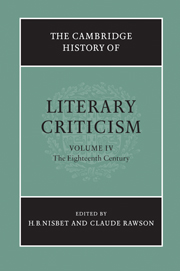Book contents
- Frontmatter
- INTRODUCTION: CRITICISM AND TRADITION
- GENRES
- 3 Poetry, 1660-1740
- 4 Poetry, after 1740
- 5 Drama, 1660-1740
- 6 Drama, after 1740
- 7 Prose fiction: France
- 8 Prose fiction: Great Britain
- 9 Prose fiction: Germany and the Netherlands
- 10 Historiography
- 11 Biography and autobiography
- 12 Criticism and the rise of periodical literature
- LANGUAGE AND STYLE
- THEMES AND MOVEMENTS
- LITERATURE AND OTHER DISCIPLINES
- Bibliography
- Index
- References
6 - Drama, after 1740
from GENRES
Published online by Cambridge University Press: 28 March 2008
- Frontmatter
- INTRODUCTION: CRITICISM AND TRADITION
- GENRES
- 3 Poetry, 1660-1740
- 4 Poetry, after 1740
- 5 Drama, 1660-1740
- 6 Drama, after 1740
- 7 Prose fiction: France
- 8 Prose fiction: Great Britain
- 9 Prose fiction: Germany and the Netherlands
- 10 Historiography
- 11 Biography and autobiography
- 12 Criticism and the rise of periodical literature
- LANGUAGE AND STYLE
- THEMES AND MOVEMENTS
- LITERATURE AND OTHER DISCIPLINES
- Bibliography
- Index
- References
Summary
The theory and criticism of neo-classical drama at its height had been based on principles of generic purity and exclusiveness; the three dramatic genres, tragedy, comedy and pastoral together were held to provide a complete picture of human life in its three forms; the life of the court, the life of the town and the life of the country (d'Aubignac, Pratique, p. 142). Such notions, which had previously been subject to only isolated questioning, came increasingly under fire during the earlier part of the eighteenth century and, from 1740 onwards, the overriding tendency was towards convergence rather than distinction of the genres. As the aristocratic court societies were confronted by an increasingly self-confident urban bourgeoisie, the theatre, the most public of literary media, became increasingly exposed to the demands of a social group looking for the serious treatment of its own values and feelings, and rinding its spokesmen as much among the theorists and critics of drama as among the practising dramatists. Initially the debate took place with reference to the definitions provided by Aristotle, which earlier commentators had taken to refer to the social status of the participants in the drama. Only with the emergence of a new historicist aesthetics in the 1770s did the absolute validity of the Aristotelian model come to be called in question; this signalled the end of one line of dramatic criticism and opened the way for a bolder and more innovative approach to drama than had been adopted in the eighteenth century.
- Type
- Chapter
- Information
- The Cambridge History of Literary Criticism , pp. 184 - 209Publisher: Cambridge University PressPrint publication year: 1997
References
- 1
- Cited by

